As soon as I put the gun down on another wildfowling season my thoughts turn towards the sport that bridges the gap and keeps me in wild places, catching truly wild things… sea trout.
These fish start life as humble brown trout but a migratory gene makes its presence felt after a couple of years and, turning blue-silver, some of these small fish head out feed in the estuaries and littoral areas of our coastline on sandeels, small fish and prawns.
They return in late spring and throughout the summer and unlike salmon, they’ll return year-on-year – getting bigger with each passing season – most salmon only get the one opportunity to breed and nearly all die in the process.
Like salmon, sea trout rarely feed once back in fresh water – which makes fishing for them seem a somewhat daft exercise. And they are the shyest of creatures, hiding their often substantial frames in innocent looking pools and in the smallest of rivers. Probably at one of the extreme ends of fly-fishing your sea trout fisherman is likely to be found waiting for dark before casting a line for them with a high sense of anticipation and equal measures of hope.
My river of choice is a small, unassuming and often overlooked gem that twists and gently meanders through a broad, lush valley in Devon. Recent rain had pestered the region for the past fortnight and the river had just dropped and cleared enough to warrant a trip to try and catch an early season “silver tourist”.
These fish start life as humble brown trout but a migratory gene makes its presence felt after a couple of years and, turning blue-silver, some of these small fish head out feed in the estuaries and littoral areas of our coastline on sandeels, small fish and prawns.
They return in late spring and throughout the summer and unlike salmon, they’ll return year-on-year – getting bigger with each passing season – most salmon only get the one opportunity to breed and nearly all die in the process.
Like salmon, sea trout rarely feed once back in fresh water – which makes fishing for them seem a somewhat daft exercise. And they are the shyest of creatures, hiding their often substantial frames in innocent looking pools and in the smallest of rivers. Probably at one of the extreme ends of fly-fishing your sea trout fisherman is likely to be found waiting for dark before casting a line for them with a high sense of anticipation and equal measures of hope.
My river of choice is a small, unassuming and often overlooked gem that twists and gently meanders through a broad, lush valley in Devon. Recent rain had pestered the region for the past fortnight and the river had just dropped and cleared enough to warrant a trip to try and catch an early season “silver tourist”.
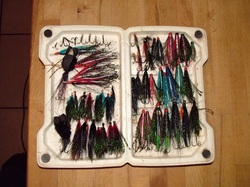
I started as usual - obsessing about the weather, the moon, the tides and whether I have the fly in my bag that will tempt a fish into taking. The trip South has me day dreaming of the river, thinking about areas I want to cover with the flies and hoping I’ll have my favourite stretch to myself.
I arrived early, far too early to be honest, but I got the chance to wander downstream, cross a rickety bridge and settle myself on the bank overlooking a length that I know will have some fish moving at dusk. It’s a magical time, balanced between the nervous anticipation and just drinking in the surroundings – observing otters, herons, roe deer, mallard and egrets as they go about their business. I’ll set up my rods – one on a slow sinking line with two large fishy-looking flies and another on a floating line with a bushy surface lure to pull across the river in the dark.
I arrived early, far too early to be honest, but I got the chance to wander downstream, cross a rickety bridge and settle myself on the bank overlooking a length that I know will have some fish moving at dusk. It’s a magical time, balanced between the nervous anticipation and just drinking in the surroundings – observing otters, herons, roe deer, mallard and egrets as they go about their business. I’ll set up my rods – one on a slow sinking line with two large fishy-looking flies and another on a floating line with a bushy surface lure to pull across the river in the dark.
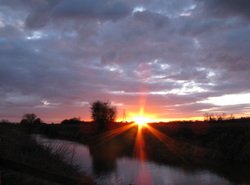
The sun sets behind the hills and slowly dusk creeps in – bats zip about the place, brown trout slash at a skittering sedge and then SPLA-DOOSH – the first sea trout makes its presence known 50 metres away. It doesn’t help matters, nor the other couple of fish that boil at the surface whilst I’m waiting – desperately wanting to make a cast but I won’t start until I can’t see the green of the grass on the far bank.
It’s gone 10pm and I can’t wait any longer. Picking up my rod I headed upstream, let out some line and start casting to the nooks and crannies between the reeds and bushes on the far bank. Each cast brings a heightened sense of expectation, anticipating the sudden and savage pull of a fish renowned to be the hardest fighting in British waters. I slowly move down the stretch, casting, gently retrieving the line and trying to be as accurate as I can as it gets evermore dark.
It’s gone 10pm and I can’t wait any longer. Picking up my rod I headed upstream, let out some line and start casting to the nooks and crannies between the reeds and bushes on the far bank. Each cast brings a heightened sense of expectation, anticipating the sudden and savage pull of a fish renowned to be the hardest fighting in British waters. I slowly move down the stretch, casting, gently retrieving the line and trying to be as accurate as I can as it gets evermore dark.
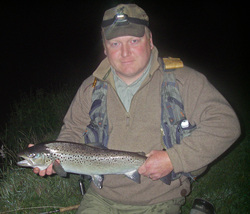
Passing behind a fallen alder I’m now “in the zone”, casting nicely and hearing fish jump every 15 mins or so above and below me. 10pm becomes 11pm becomes midnight ever so quickly as I slowly moved downstream. Then, at 12:30am, that long anticipated surge of life yanks me out of my thoughts and I lift into a decent fish that jumps, runs and strips line off the reel with alarming ease. I need to get control of the situation but the fish is having none of it – powerful runs and dogged spells of head shaking below the surface I’m now almost praying for it to stay on. Gradually I get into the game and can start to control him with the rod held high and line kept taut. 5 mins or so passes and eventually he comes to the surface on his side, I unhook the net and lean down to scoop him up and on to the bank… “My fish!” I call to the world at large and turn my back to the river to admire the prize from all this effort and concentration. He is a good fish, not huge but long, powerfully built and gleaming like a bar of chrome in the torchlight. I check he’s not a salmon (they’re protected here) before dispatching him and putting him in the bag.
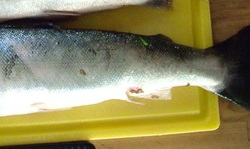
The pressure’s off, I’m calmer but more determined to get a second before I have to leave at 1am. Sure enough the fish have obviously switched on for a short period and it’s only a few casts and ten short minutes later when I get that second addictive take from a slightly larger fish that also gives me the run- around before coming to the net, this one fresh in from the sea within the last 48 hours as he still has sea lice on his gleaming flanks.
Time to pat myself on the back, neck a quick coffee and then head back to the car for the long trip home, beaming to myself with a sense of satisfaction that it all came together once again and wondering when I might next be able to slip away to put myself through that wonderful ordeal again.
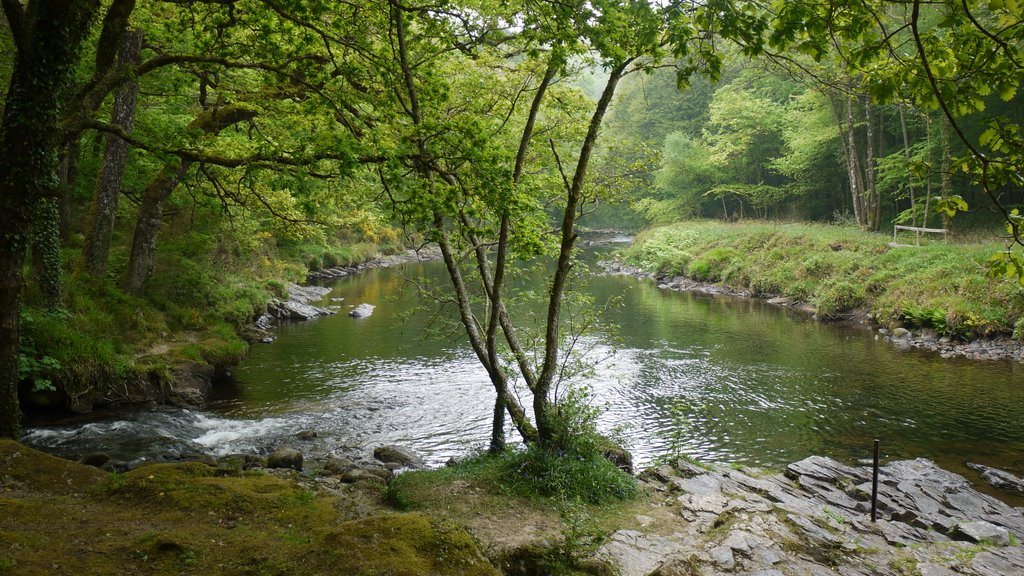
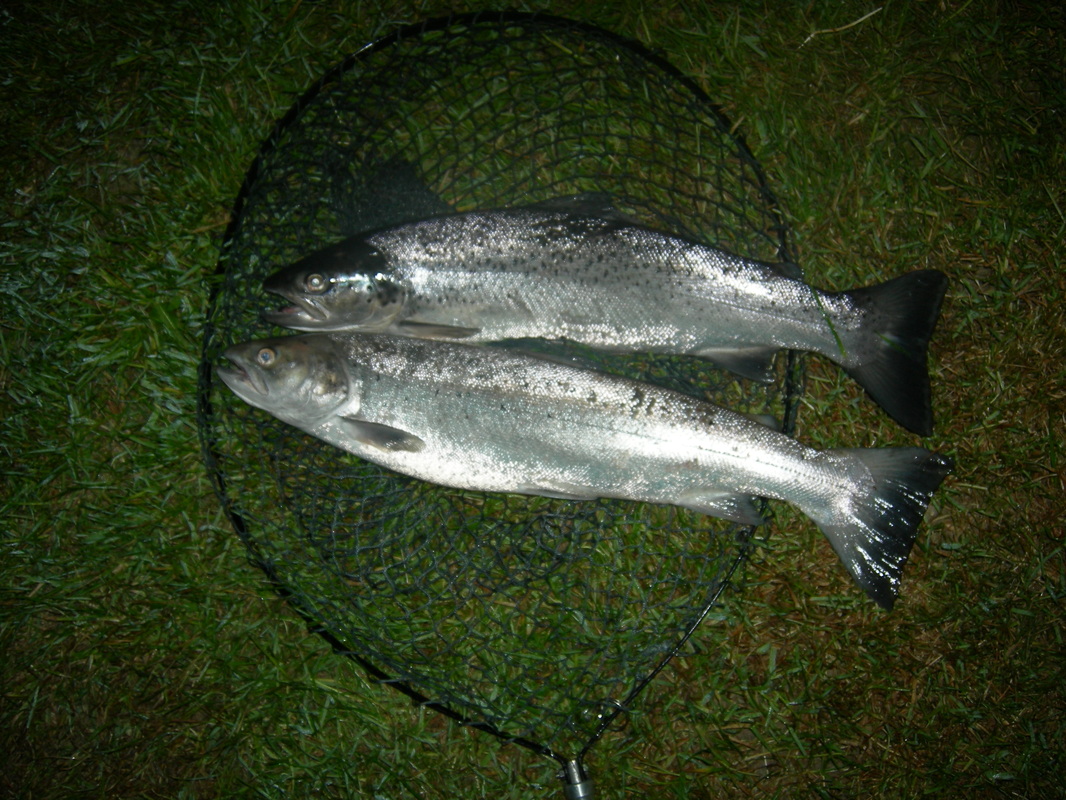
 RSS Feed
RSS Feed
